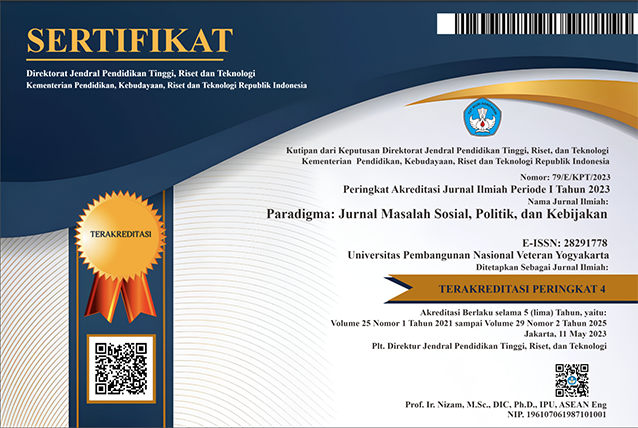Disaster Preparedness Communication for Residents at Kalibata City Apartment
DOI:
https://doi.org/10.31315/paradigma.v28i2.12277Keywords:
disaster management, disaster communication, kesiapsiagaan bencana, hunian vertikalAbstract
The construction of vertical housing or apartments is one of the government's efforts to meet the increasing residential needs of urban communities. The hazards that haunt a housing area such as the occurrence of unit fires, the feeling of earthquakes to other events will cause potential disasters and pose a risk. Residents have the right to live in a safe and comfortable residence, of course, with the obligation of the building manager to be able to facilitate these conditions. Effective communication is an important part of receiving messages and information that suits the needs of residents in understanding the risks that exist. The research was conducted to see the ways of communication carried out by residents who live in Kalibata City apartments as a form of disaster preparedness. The method of observation and direct involvement in forums in the Kalibata City resident community was carried out by combining literature review from previous documents. The result of the research is a communication method found in a community in a vertical residential area that matches the character of urban society.
Downloads
Published
How to Cite
Issue
Section
License
The manuscript submitted to Paradigma: Jurnal Masalah Sosial, Politik, dan Kebijakan journals are released under the license of Creative Commons Attribution-Non Commercial- ShareAlike (CC BY SA) if and when the article is accepted for publication.
We declare that:
- This paper has not been published in the same form elsewhere.
- It will not be submitted anywhere else for publication prior to acceptance/rejection by this Journal.
- A copyright permission is obtained for materials published elsewhere and which require this permission for reproduction.
Retained Rights/Terms and Conditions
Authors retain all proprietary rights to the published works, such as (but not limited to) the following rights:
- Copyright and other proprietary rights relating to the article, such as patent rights,
- The right to use the substance of the article in own future works, including lectures and books,
- The right to reproduce the article for own purposes,
- The right to self-archive the article
The right to enter into separate, additional contractual arrangements for the non-exclusive distribution of the article's published version (e.g., post it to an institutional repository or publish it in a book), with an acknowledgment of its initial publication in this journal Paradigma: Jurnal Masalah Sosial, Politik, dan Kebijakan



